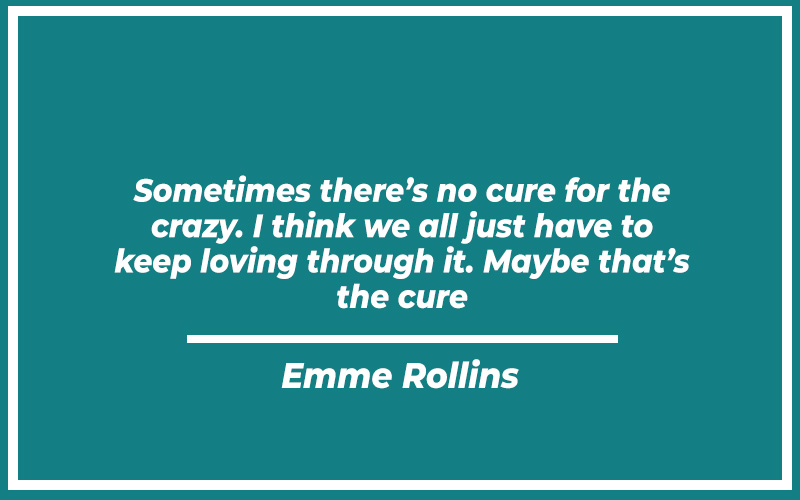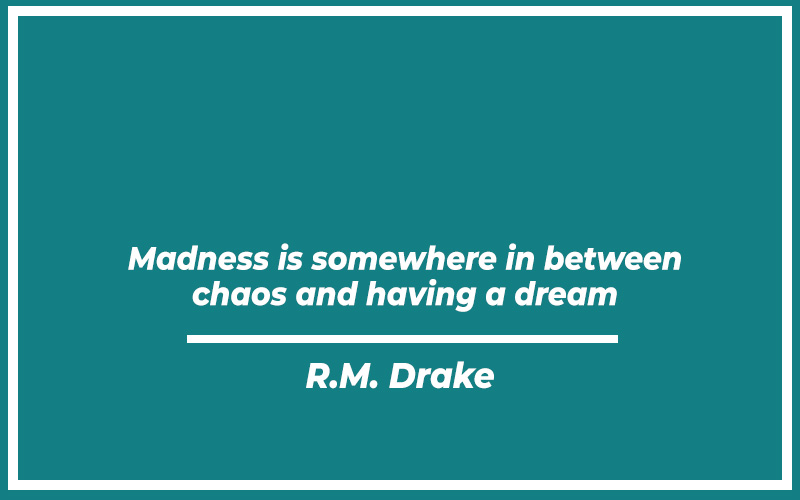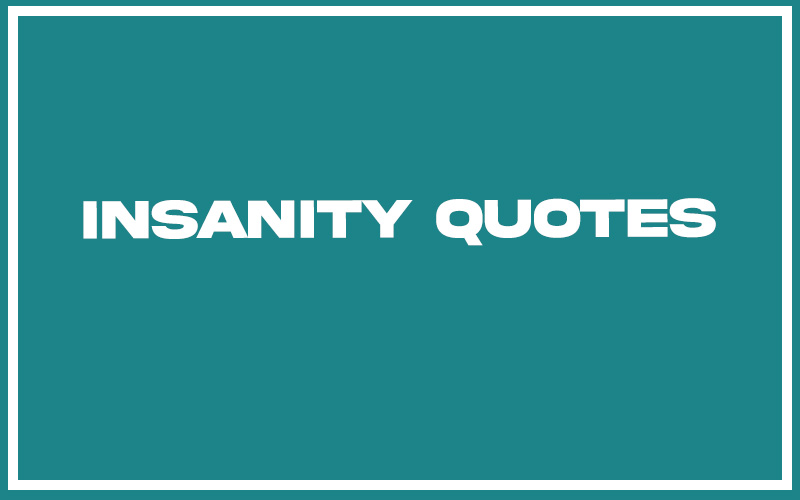If you’ve ever been fascinated by the thin line between genius and madness, then insanity quotes will catch your attention. These quotes often explore the depths of the human mind, touching on the complexities and mysteries that lie within.
Whether they’re attributed to famous historical figures, literary characters, or modern-day thinkers, insanity quotes challenge you to consider how passion, creativity, and extremities of thought can sometimes skirt the edges of what many consider ‘normal.’
As you delve into these quotes, you’ll be invited to question the conventional boundaries of sanity and the intriguing possibilities that lie beyond.
Best Insanity Quotes

“Sometimes there’s no cure for the crazy. I think we all just have to keep loving through it. Maybe that’s the cure.” – Emme Rollins
Emme Rollins touches on the idea that love may be the remedy we need when dealing with the inexplicable or when facing mental health challenges that seem beyond repair. This quote suggests that embracing our struggles with compassion and love could lead to a form of healing, or at least make the journey more bearable.
It invites us to view love not just as a feeling but as a healing action, which can bring solace even in the most chaotic times.
Also Read: Meet The Robinson Quotes (with Explanation)
“I don’t suffer from insanity, I enjoy every minute of it.” – Unknown
This quote challenges conventional perceptions of sanity and insanity, suggesting that what is often labeled as madness can be a source of joy and liberation for some. It presents the idea that embracing one’s unique mind, even if it deviates from the norm, can lead to a fulfilling and exhilarating experience.
This perspective encourages us to find value in our differences and to celebrate the diversity of human experiences.
“A non-writing writer is a monster courting insanity.” – Franz Kafka
Franz Kafka vividly describes the inner turmoil that can afflict writers who do not practice their craft. This quote suggests that creativity stifled is not just a loss of productivity but a path toward mental unrest.
Kafka’s words serve as a stark reminder of the importance of expressing one’s creative impulses to maintain mental well-being.
“When the whole world is crazy, it doesn’t pay to be sane.” – Terry Goodkind
Terry Goodkind reflects on the irony of sanity in a world overwhelmed by madness. This quote posits that in a society where irrationality prevails, maintaining one’s sanity can sometimes feel futile or out of place.
It encourages a reevaluation of what it means to be sane in a world that often doesn’t seem to value reason.
“If you think anyone is sane you just don’t know enough about them.” – Christopher Moore
Christopher Moore’s observation suggests that everyone has aspects of irrationality, and that complete sanity is perhaps an illusion.
This quote invites us to consider the complexity of human psychology and the universal presence of idiosyncrasies and irrational moments in everyone’s life, promoting a more compassionate and understanding approach to human behavior.
“Insanity is often the logic of an accurate mind overtasked.” – Oliver Wendell Holmes, Sr.
Oliver Wendell Holmes, Sr., provides an insightful look into how excessive demands on one’s mental faculties can lead to what is perceived as insanity.
This quote highlights the thin line between high-functioning intellect and the potential for mental overload, urging awareness of our mental limits and the need for balance.
“Madness and insanity are two terms that are so vague and relative that you can’t really apportion proper values to them.” – Alan Moore
Alan Moore critiques the subjective nature of terms like madness and insanity, suggesting that these labels are too fluid and context-dependent to define clearly. He implies that functionality should be the measure of concern rather than arbitrary labels of sanity.
This perspective shifts focus from stigmatizing terms to a more pragmatic approach of assessing whether one’s mental state allows them to function effectively in their environment.
“Insanity is knowing that what you’re doing is completely idiotic, but still, somehow, you just can’t stop it.” – Elizabeth Wurtzel
Elizabeth Wurtzel’s quote explores the perplexing nature of human behavior, where individuals may continue actions they know are irrational. This reflection on insanity highlights the complex interplay between cognition and compulsion, suggesting that awareness does not always equate to control.
It invites contemplation on the limits of rationality and the enigmatic forces that drive us to act against our better judgment, underscoring the sometimes inexplicable nature of human actions.
“And those who were seen dancing were thought to be insane by those who could not hear the music.” – Friedrich Nietzsche
Friedrich Nietzsche’s poetic observation suggests that perceptions of insanity are often a matter of perspective. This quote celebrates nonconformity and the misunderstood beauty of acting outside societal norms.
It challenges us to consider the subjective nature of sanity and the judgments we cast on those who differ from the majority, encouraging a more empathetic and open-minded approach to understanding others’ actions.
“I became insane, with long intervals of horrible sanity.” – Edgar Allan Poe
Edgar Allan Poe’s introspective comment on his mental state reveals his torment in moments of clarity and his relief in madness. This quote suggests that for some, insanity can be an escape from the painful realities of life.
Poe’s words open a window into the struggles associated with mental health and the complex relationship individuals might have with their own minds, blending the lines between sanity and insanity.
“The employment of children is doing more to fill prisons, insane asylums, almshouses, reformatories, slums, and gin shops than all the efforts of reformers are doing to improve society.” – H.L. Mencken
H.L. Mencken criticizes the societal structures that exploit children, suggesting that these practices contribute more to societal degradation than efforts to ameliorate conditions.
This quote reflects on the insanity of societal norms that harm the most vulnerable and underscores the need for genuine reform. It calls for a reevaluation of practices and priorities to foster a healthier, more just society.
“Insanity is just a state of mind.” – Alain de Botton
Alain de Botton’s statement simplifies the concept of insanity to a mental condition, challenging the stigma associated with mental health disorders.
This quote encourages a reconsideration of how we view mental health, promoting a more understanding and less judgmental perspective. It suggests that insanity, like any mental state, is part of the human condition and should be approached with empathy rather than fear.
“Sanity and sense becomes a handicap in a mad world.” – Unknown
This quote contemplates the disadvantages of rationality in an irrational world, suggesting that sanity might be a burden in environments governed by chaos. It highlights the challenges faced by those who attempt to maintain reason and morality in settings that do not value these traits.
The quote invites reflection on the need for balance and the courage required to uphold one’s principles in a world that often seems senseless.
“If everyone was insane, then insanity would be normal.” – Unknown
This quote explores the concept of normalcy in behavior, proposing that if insanity were widespread, it would no longer be considered abnormal. It challenges the constructs of normality and insanity, suggesting that these are socially defined based on majority behavior.
The quote prompts us to question the standards by which we judge mental states and behaviors, encouraging a more fluid understanding of what is considered sane or insane.
“What is madness but nobility of the soul at odds with circumstance?” – Theodore Roethke
Theodore Roethke’s contemplation of madness suggests that it can be a noble reaction to unfavorable or extraordinary circumstances. This perspective views insanity not as a defect but as a soul’s noble struggle to cope with a world that does not align with its inner truth.
It highlights the idea that sometimes, what is deemed madness is merely an individual’s intense confrontation with the discord between their nature and their environment, promoting a more compassionate understanding of mental struggles.
“Insanity is doing the same thing over and over again and expecting different results.” – Albert Einstein
This well-known quote attributed to Albert Einstein speaks to the folly of repetitive failures expecting change. It’s often cited in discussions of problem-solving and behavior modification, suggesting that true insanity lies in the inability to adapt strategies based on feedback.
This outlook encourages innovation and flexibility in thinking, urging us to reevaluate our methods when results do not meet our expectations, advocating for a more dynamic approach to life’s challenges.
“In individuals, insanity is rare; but in groups, parties, nations, and epochs, it is the rule.” – Friedrich Nietzsche
Nietzsche’s observation emphasizes the prevalence of irrational behaviors in collective settings compared to individual actions. This quote explores the concept that within larger groups or over historical periods, what is considered ‘sane’ can often become subsumed by mass beliefs or behaviors that, from an individual perspective, might be seen as insane.
It challenges us to remain critical of societal norms and collective actions, stressing the importance of individual judgment against the backdrop of group dynamics.
“Madness, as you know, is like gravity. All it takes is a little push.” – Joker (The Dark Knight)
This quote from the character Joker in “The Dark Knight” illustrates the fragile boundary between sanity and insanity, suggesting that a small trigger can lead to a descent into madness. It highlights the precariousness of mental stability and the potential for external factors to disrupt psychological equilibrium.
This perspective invites us to consider the vulnerabilities inherent in the human psyche and the impact of environmental influences on our mental health.
“The difference between insanity and genius is success.” – Bruce Feirstein
Bruce Feirstein’s quote suggests that the line between insanity and genius can often be defined by the outcome of one’s endeavors. It implies that unconventional or radical ideas may be perceived as insane until they achieve success, at which point they are reclassified as genius.
This commentary encourages a reevaluation of how we judge unconventional thinking, highlighting the subjective nature of such assessments and the role of societal acceptance in defining sanity.
“There is a pleasure, sure, in being mad, which none but madmen know.” – John Dryden
John Dryden explores the intrinsic satisfaction that can come from madness, suggesting there is a unique joy in mental states that are outside the norm. This quote acknowledges that within what society deems as insanity, there might be an experiential richness inaccessible to those who have never shared that state.
It promotes a deeper empathy and curiosity about different mental experiences, enriching our understanding of human psychological diversity.
“Sometimes the only way to stay sane is to go a little crazy.” – Unknown
This quote acknowledges the therapeutic release that can come from momentarily embracing madness. It suggests that in a world rigid with norms and expectations, allowing oneself a departure from strict rationality can provide mental relief and a necessary break from the pressures of constant sanity.
This perspective supports the idea of balance in mental health, proposing that sometimes, the healthiest choice might be to indulge in a controlled escape from convention, which can help maintain overall psychological well-being.
“All the best people are crazy.” – Unknown
This quote playfully suggests that eccentricity and creativity often go hand in hand, and that those who stand out for their unique perspectives or behaviors are typically the most memorable. It challenges the conventional definitions of normalcy and celebrates the quirks and idiosyncrasies that define human diversity.
By framing ‘craziness’ as a positive attribute, it encourages acceptance and appreciation of differences, promoting a more inclusive understanding of what it means to be truly exceptional.
“Reality is just a crutch for people who can’t handle insanity.” – Unknown
This humorous take on reality and insanity suggests that conventional views of the world are merely tools for those unable or unwilling to explore beyond the mundane. It challenges us to question the limits of what is considered sane and invites us to embrace a broader spectrum of experiences and perspectives.
The quote playfully proposes that stepping outside conventional thinking can lead to richer, although perhaps unconventional, understandings of the world.
“Sanity is not statistical.” – George Orwell
George Orwell’s assertion implies that sanity cannot be defined by the majority’s behavior or beliefs. This quote from “1984” challenges the idea that what most people think or do should set the standard for what is considered rational or sane.
It advocates for the validity of individual perspectives and underscores the danger of using societal norms as the benchmark for mental health. Orwell’s words encourage defending personal truth against the pressure to conform.

“Madness is somewhere in between chaos and having a dream.” – R.M. Drake
R.M. Drake offers a poetic description of madness, placing it on a spectrum between utter disarray and visionary ambition. This perspective highlights the thin line between genius and insanity, suggesting that the creative process can often verge on chaotic as it strives toward a dream.
The quote resonates with anyone who has pursued a passion that others might not understand, suggesting that extraordinary achievements often require a touch of madness.
“Insanity: doing the same thing over and over again but expecting different results.” – Rita Mae Brown
Often misattributed to Einstein, this quote by Rita Mae Brown speaks to the futility of unchanged efforts when faced with repeated failures. It calls for a reassessment of methods and encourages innovative thinking when traditional approaches fail.
The quote serves as a reminder of the importance of adaptability and creativity in problem-solving, promoting a dynamic approach to challenges.
“Madness is the emergency exit. You can just step outside, and close the door on all those dreadful things that happened. You can lock them away… forever.” – Alan Moore
Alan Moore, through his character in “The Killing Joke,” suggests that madness can be a form of escape from unbearable reality. This dark take on insanity proposes that when the pain of reality becomes too much to bear, retreating into madness can provide a refuge.
It captures the complex relationship some may have with their mental state, viewing it as both a prison and a sanctuary.
“Insanity is relative. It depends on who has who locked in what cage.” – Ray Bradbury
Ray Bradbury’s quote offers a critical view of how sanity and insanity are often defined by context and power dynamics. It suggests that judgments about mental health can depend more on social constructs and power relations than on objective criteria.
This perspective challenges us to consider the fairness and bias in our assessments of others’ mental states, advocating for a more nuanced and compassionate approach to understanding human behavior.
Also Read: Squilliam Fancyson Quotes (with Explanation)
Final Thoughts
Insanity quotes stir the mind and provoke deeper reflection on what it means to think and feel intensely.
As you reflect on these compelling words, let them inspire you to embrace the full spectrum of human experience, including those moments that may seem irrational or unconventional.
Remember, some of the most groundbreaking ideas in history were once deemed insane by contemporary standards. Let these quotes remind you that sometimes, stepping beyond the usual limits of thought can lead to extraordinary insights and innovations.

